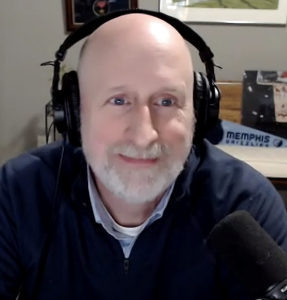Christian fundamentalists are drawn to Donald Trump’s MAGA movement by a shared commitment to “certainty, ferocity and loyalty,” New York Times columnist David French said.
“There isn’t one fundamentalist theology, but there is a fundamentalist mindset, and that fundamentalist mindset matches Trumpism really well, culturally,” French said during a December webinar hosted by the McLendon Scholar program at New York Avenue Presbyterian Church in Washington, D.C.

David French
French said he was first tipped off to the distinction by Richard Land, a former president of the Southern Baptist Convention Ethics and Religious Liberty Commission.
“He said this thing that stuck with me for years. He said: ‘Don’t think of fundamentalism as a theology. Think of it as a psychology.’ Because there isn’t one set fundamentalist theology. You can have Calvinists and Arminians going hammer and tongs after each other.”
But what they have in common is a black-and-white worldview, a willingness to be aggressive and absolute allegiance to a cause, French said.
“The fundamentalist mindset is characterized by certainty. There is not a lot of doubt in the fundamentalist world,” he continued. “It is characterized by ferocity. If you have brushed up at all against the fundamentalist Christian world, you recognize the ferocity and also the group solidarity. There is very little tolerance for group dissent but a huge emphasis on group cohesion.”
U.S. Sen. Mitt Romney possessed the picture of piety during his failed 2012 presidential run against incumbent Barack Obama but never found his rhythm with conservative Christians, French said.
“Mitt was culturally out of step with fundamentalism and Trump, even though (Trump) wouldn’t know ‘Two Corinthians’ if it bit him in the face (and) is actually temperamentally more like a fundamentalist,” French said.
“The foundation of his power through all of those scandals is evangelical Christians.”
Trump would have remained a historical footnote without the political support of conservative Christians, he asserted. “Evangelical Republicans made him president, evangelical Republicans almost made him president again, and evangelical Republicans may make him president again this November despite the divorce, infidelity, hush money, being found liable for sexual assault in a court by a jury — we can do this all day — the attempt to steal the election. The foundation of his power through all of those scandals is evangelical Christians.”
The gulf between Trump supporters and opponents is increasingly widening due to a social phenomenon described by the More in Common research group as “negative polarization,” French said. It holds that Americans are choosing political parties not for their platforms, but because they are hostile toward members of the opposing party.
“If you surveyed Democrats and Republicans and you asked them what they thought of each other, 82% of Republicans said they either strongly dislike or somewhat dislike Democrats. Democrats were a little bit better: 79% of them said they strongly dislike or somewhat dislike Republicans.”
Members of both parties also see mostly negative traits in the members of opposing parties, he added. “Republicans, 86% of them said Democrats are brainwashed, 84% of them said Democrats are hateful and 71% said Democrats are racist. Democrats had a very similar view of Republicans: 88% of them said Republicans are brainwashed, 87% said Republicans are hateful and 89% said Republicans are racist.”
Worse still, researchers are reporting a trend called “lethal mass partisanship,” in which respondents say they would be OK if members of the opposition parties weren’t murdered but “just died,” French said.
About 20% of Americans agreed with that statement, representing 45 to 50 million U.S. adults, he said. “You can see the negativity, the hatred, the toxicity every time you turn on cable news, every time you open the app formerly known as Twitter. It is overwhelming.”
Negative polarization and lethal mass partisanship emerge from the belief that the ends justify the means in politics, French said. “We’ve created an atmosphere in American politics where we tell Christians it’s just the outcome that matters.”
He cited an essay in a leading evangelical publication declaring that decency and civility are subordinate “to the importance of engaging in this sort of no-holds-barred political combat.”
When the followers of a religion that demands “love your enemies” and “bless those who persecute you” conclude civility is a second-order virtue, it reveals that “we have some serious flaws in spiritual formation in the world of politics,” the columnist explained.
And the consequences can be dangerous if not addressed, French said. “It’s not just disturbing. In many ways, it’s a little bit scary. You’re beginning to see unfolding the logic of religious war, this idea that says God is on our side, our opponents are demonic, and everything is at stake in the election. That creates the logic, the momentum of religious war.”
“Christians are among the most angry people in the United States.”
January 6 was an expression of that logic, he continued. “It was a time of anger. It was time of animosity. And Christians are among the most angry people in the United States.”
It’s a demonstration that evangelicals have become known for their fear-based victim mentality, French said. “In many ways, evangelicals — in particular Republican evangelicals — are driving the animosity bus. What we’re beginning to see is a lot of rage and fear, and this is something that should not characterize the Christian community.”
The counter to these sinister trends can be found in Micah 6:8. Its commands to “act justly, love mercy and to walk humbly” are the “three commandments” for restoring balance to American Christianity and politics, French said.
The first compels believers to engage in the political system, but in a way that supports candidates and policies that promote justice and compassion. “Christians cannot walk away from the quest for justice. That is an inescapable element of obedience.”
The counter-anger movement also must practice humility, the fruits of which include self-awareness and a willingness to admit mistakes. And it’s important they support politicians and other leaders who do the same, French said.
“Having the self-awareness about our own limitations helps us walk humbly. This is so important even on the most difficult issues in American life, the most volcanic, explosive issues in American life, walking humbly.”
Walking humbly in turn generates mercy and compassion, he added. “It’s very important to understand both your own limitations and the incalculable worth of the other person with whom you’re interacting, that this is a person created in the image of God, who possesses incalculable worth.”
French said some have told him the Micah approach to American political and social turmoil is a pie-in-the-sky dream, and he acknowledges there are certainly no guarantees. But the ministries of Jesus and Martin Luther King Jr. suggest it can work. Both men made incredible strides for justice against tremendous political and social odds, he said.
“If we form with the right-sized vision of what Christianity can be in politics, we can be not just faithful to Scripture, but countercultural and exactly the way this country needs us to be countercultural.”


